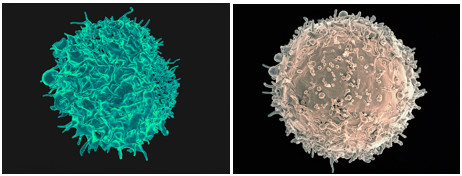Themis proteins key to maturation of infection-fighting T and B cells
Immune system proteins called Themis are essential for helping two major types of immune cells defend against disease-causing microbes, according to two studies led by researchers at the National Institutes of Health.
As T and B cells develop, they must pass quality-control checkpoints to ensure that they can ward off harmful organisms without damaging the body’s own tissues. One such checkpoint, called “positive selection,” clears cells that can respond to important immune signals. The new studies explain why Themis1 is required for the positive selection of T cells and show that Themis2 regulates the positive selection of B cells. Both studies appear in Nature Immunology.

Background
The immune system prevents or limits infection, relying on the coordinated activity of many types of white blood cells. Among them, T cells have several important functions, including killing infected or cancerous cells, as well as activating or recruiting other immune cells to join the attack. They can recruit B cells, which make antibodies that neutralize microbes and tag them for later destruction by the immune system.
T and B cells develop in a manner that allows them to potentially recognize and target anything, not just general microbial patterns. This allows the cells to respond to unforeseen challenges, such as viruses that mutate to evade the immune system. However, this flexibility also means that T and B cells could potentially target harmless molecules, causing allergies, or react against the body’s own cells or organs, leading to autoimmune disease. Therefore, the development of T and B cells is tightly controlled and relies on a number of receptor and protein interactions that regulate the cells’ threshold for activation.
Results
Researchers led by Paul Love, M.D., Ph.D., of NIH’s Eunice Kennedy Shriver National Institute of Child Health and Human Development, built upon their earlier studies showing that Themis1 is needed for T cell development. In one new study, the team discovered that Themis1 works by blocking the activity of a protein called SHP-1, which suppresses T cell activation. By reducing SHP-1’s braking action through a unique interface called CABIT, Themis1 enhances T cell activation. In particular, Themis1 is important during the positive selection stage of T cell development because T cells make less Themis1 in later stages. According to the researchers, this transient role prevents erroneous T cell activity, as SHP-1 checks the activity of mature T cells. Without this brake, T cells may damage the host after an infection is cleared or possibly cause an autoimmune disorder.
In a second study, the team focused on a related protein called Themis2 and its role in B cell development. They found that Themis2 enhances positive selection of B cells in lymph nodes, which is important for the survival and proliferation of B cells that produce antibodies capable of generating an effective immune response. The team discovered that Themis2 works by enhancing the activity of a protein called PLC-gamma2, which helps activate B cells. The researchers propose that Themis2 increases the sensitivity of B cells to weak signals that tend to occur early on during an immune response. Otherwise, if B cells require a high activation threshold, the immune system may not react sufficiently to a threat.
Significance
“Our studies show that Themis proteins have important roles regulating the activity of T and B cells,” said Dr. Love. “Themis proteins are relatively new to the immunology field. Once we learn more about their function, we can see if they may be promising therapeutic targets for autoimmune conditions, cancer, and infectious diseases.”
References
Choi S, Warzecha C, Zvezdova E, Lee J, Argenty J, Lesourne R, Aravind L, and Love PE. THEMIS enhances TCR signaling and enables positive selection by selective inhibition of SHP-1. Nature Immunology DOI: 10.1038/ni.3692 (2017)
Cheng D, Deobagkar-Lele M, Zvezdova E, Choi S, Uehara S, Baup D, Bennett SC, Bull KR, Crockford TL, Ferry H, Warzecha C, Marcellin M, Gonzalez de Peredo A, Lesourne R, Anzilotti C, Love PE, and Cornall RJ. Themis2 lowers the threshold for B cell activation during positive selection. Nature Immunology DOI: 10.1038/ni.3642 (2017)

 BACK TO TOP
BACK TO TOP